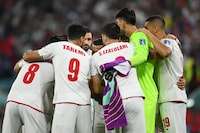DOHA, Qatar — The players on Iran’s national soccer team braved a firestorm, even before they faced the United States.
After enduring insults and threats, Iranian team exits World Cup

In their first match, against England, the players did not sing the national anthem, in what seemed to be a show of support for the demonstrations that have spread across Iran since September after the death of a young woman, Mahsa Amini, in police custody. But that gesture was not enough for some fans, who chanted against the players, calling them “dishonorable.”
By Tuesday, as the pivotal match against the United States loomed, some of Iran’s supporters who gathered in Al Thumama Stadium seemed united in the conviction the players had been through enough. Their team had been used as a cudgel by the government or its opponents, including Iranians living overseas, and wrestled over so vigorously — by those claiming the team or disavowing it — that the soccer had become an afterthought.
The pressure piled onto the team by citizens in the diaspora “is terrible,” said a supporter from Houston who spoke on the condition that she be referred to only by her first name, Sherry. “Politics should not be mixing with sport. This is not the space for that.”
Milad Seyedi, from Toronto, who wore an Iranian jersey from 1998, when the team beat the United States, said he wanted the world to understand that the players “are the people of Iran’s team. They are under all sorts of pressures. Their families are under pressure. We are not against them.”
If those sentiments lifted some of the burden on the players, it did not show in Tuesday’s result. Despite a flurry of chances in the second half, Iran lost the match, 1-0, and was eliminated from the tournament.
The team’s coach, Carlos Queiroz, who throughout the World Cup has tried to insulate the players from the politics swirling around the team, said after the match that “in terms of commitment, in terms of delivery, in enthusiasm, confidence, they did what was possible inside the pitch to score one goal.”
The next time Iran qualifies for a World Cup, he added, the players will have to better prepare, but they will also need “to have the minds, the spirit, the soul in the game,” in what seemed like a reference to all the distractions.
“Keep going,” he said of the team. “Trying to win respect, appreciation and credibility all over the world. I think they deserve it.” But even as he spoke, videos were emerging from Iran, including from Kurdish areas that have been at the center of the uprising, showing people celebrating the team’s defeat.
Months of controversy had preceded Tuesday’s match.
Before the tournament even started, the Iranian squad, known as Team Melli, was being fought over, with some Iranians calling on FIFA, soccer’s international governing body, to ban the team to acknowledge the protest movement and a bloody crackdown by the authorities that has killed hundreds of demonstrators. Others thought the team’s appearance at the World Cup offered a chance to gain more visibility for the uprising.
As the tournament got underway, social media posts lamented the focus on the soccer team as the death toll rose. “Islamic Republic team scored 2 goals, and Baluchistan received tens of bullets,” read one post, referring to crackdowns in southeastern Iran.
Before Iran’s second match, against Wales, Iranian authorities arrested a former member of the national team who has been critical of the government, in what was widely seen as a warning to members of the World Cup squad not to support the protests. The next day, in the World Cup stadium, Qatari police officers removed some fans who wore T-shirts supporting the uprising, apparently at the behest of Iranian authorities.
In all the turmoil, the idea of a “clash” between teams from the United States and Iran — given the antipathy between the two governments — seemed like an afterthought, or even an anachronism, as fans from the two countries mixed easily in the stands Tuesday.
All the spectators “have mixed feelings,” said Sina, who traveled from Sydney and also spoke on the condition that he be referred to only by his first name. “The Islamic Regime is trying to hijack this team’s success,” he said, referring to Iran’s clerical leadership. Iran’s people “need American support against the violent regime.”
“But I want Iran to win this game,” he said.






